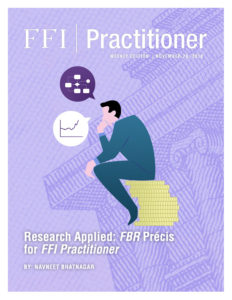
View this edition in our enhanced digital edition format with supporting visual insight and information.
How can relationship conflict and socioemotional costs impact a family business owner’s subjective assessment of the firm’s value? In this week’s edition, which is a précis of “Relationship Conflict, Family Name Congruence, and Socioemotional Wealth in Family Firms,” an article appearing in the December issue of FBR, Navneet Bhatnagar explores this question and the relevant implications for practitioners.
Family firm owners derive both financial and non-financial utility from firm ownership. Their subjective valuation of the firm, i.e., the price at which they are willing to sell the firm to an outsider, accounts for both these utilities. The non-financial utility is the affective endowment, termed socioemotional wealth (SEW), which owners accrue from firm ownership. Family owners’ desire to preserve/enhance SEW is known to drive family firm behavior and decision-making. However, the literature is not clear on how the owners handle negative fallouts of firm ownership – i.e., ‘socioemotional costs’ (like, relationship conflicts) and how these negative fallouts affect firm valuation.
A publicly traded firm is valued by its stock price, but no market valuation parameter exists for privately-owned family firms. Their valuation is only subjectively ascertained by the owners. In this study, the authors interview 149 CEO owners of privately-owned German family firms to understand how family owners account for the socioemotional costs of relationship conflict in their subjective assessment of firm value. The authors draw on SEW, behavioral agency model (BAM), mixed gambles, and prospect theory literature and challenge the intuitive assumption that socioemotional costs of relationship conflict drives down family firm valuation. They argue that the effect of relationship conflict on firm valuation varies in different contexts.
Relationship Conflict and Family Firm Valuation
Tension and friction among individuals on account of interpersonal incompatibilities is termed as relationship conflict. It is embedded with negative emotions and is characterized by disagreements, arguments, and hostility. Relationship conflict hinders organizational tasks and affects firm performance. The authors argue that in the family business context, this dynamic becomes complex and leads to a ‘U’ shaped relationship between relationship conflict and firm valuation:
(1) When there is no relationship conflict, there is harmony among family members. This increases SEW and boosts family members’ commitment to the firm. Owners place a high value on SEW and thus, their subjective valuation of the family firm is high.
(2) Low or moderate levels of relationship conflict erode mutual understanding among family members. Engulfed in sadness and frustration, family members long to change their circumstances and may think of exiting the firm. They are willing to accept a lower firm valuation to fulfill their desire to exit.
(3) At higher levels of conflict, the negative effect goes to the extreme. Family members’ commitment into the conflict escalates. They have little left to preserve SEW, hence are more focused on financial wealth. They account for the socioemotional costs in their firm valuation and want to be compensated for the emotional pain suffered. This results in a higher subjective valuation of the family firm.
The Role of Family and Firm Name Congruence
When the family and firm share the same name, the strength and visibility of the bond between the family and business are high. This enhances SEW. The authors argue that name congruence interacts with the relationship between conflict and firm valuation in the following manner:
(1) When the family and firm share their names and there is no or low relationship conflict, the SEW is intact. Hence, name congruence has little effect on the connection between relationship conflict and firm valuation.
(2) At moderate levels of relationship conflict, perceived vulnerability is experienced by family members. Their reference point shifts to financial concerns. Family members’ awareness of the inextricable link between the firm and the family increases their subjective valuation of the firm.
(3) At higher levels of conflict, family members become wary of the conflict’s negative spillovers on family reputation and future value of the firm. In such circumstances, they may view selling the firm as a way to extract and safeguard the firm’s value against the anticipated future loss of both SEW and financial wealth.
Key Findings
The statistical analysis conducted by the authors confirmed the ‘U’ shaped correlation between relationship conflict and subjective valuation of the firm and the ‘inverted U’ shaped interaction effect of name congruence. The findings prove that depending on their distinct contexts, family owners account differently for socioemotional costs while arriving at the subjective valuations of their firms. These valuations are not only influenced by the varying levels of relationship conflict in the family but are also moderated by the extent of inter-dependencies created by name congruence between the family and the firm.
Implications for Research
- The study establishes that socioemotional costs influence family owners’ firm valuations in a complex manner, depending on the firm’s context. Future studies in different cultural settings may test the generalizability of the findings.
- The study shows that family and firm identity linkages had an indirect and NOT direct influence on firm valuation. Beyond name congruence, researchers may examine other factors that may affect valuation.
- The study explains how family members’ commitment to resolve conflict owing to the costs involved, may force some family firms to endure relationship conflicts rather than selling out. However, individual family members could perceive and deal with relationship conflict differently. Future research may take into account the responses from multiple family owners within each firm to assess these differences.
Implications for Family-Owned Firms
- Though relationship conflict is emotional, the best interest of the family and the firm is served by dealing with it rationally. Early resolution of conflict will help the family preserve its SEW and financial wealth.
- If the relationship conflict is at a moderate level, then instead of acting in anger and frustration and forcing an early exit, family members must try to endure and resolve the conflict. This approach is more sensible especially where the family and firm identities are congruent.
- In cases where the relationship conflict has escalated to a point beyond repair, it is prudent for the family owners to sell out before the loss of SEW and financial wealth wipes out a sizeable amount of value from the firm. Instead of continuing to fight hollow prestige battles or demanding impractical valuations, family owners must think beyond their personal egos and act fast to minimize the losses and protect welfare.
Implications for Practitioners
- Family business practioners need to be cognizant of potential sources of relationship conflict and help their clients take preventive measures to ensure that these conflicts do not arise.
- If a conflict has emerged, advisers must help their clients resolve it early instead of ignoring the matter. Especially if the family and firm identities are common, they must act quickly. Advisers must also help their clients overcome anger and frustration and prevent them from acting impulsively (selling out).
- In case the conflict appears to have reached a situation beyond repair (or is coming to that), the adviser would do well to suggest to the client to exit the firm while there is some value left to salvage. Clients holding on to the pride of firm ownership or unrealistic valuations must be counselled not to compound their losses.
About the contributor
 Navneet Bhatnagar, PhD, CFBA is Senior Researcher at the Thomas Schmidheiny Centre for Family Enterprise, Indian School of Business, in Hyderabad, India. He is the recipient of the 2018 de Visscher & Co. GEN scholarship. He can be reached at Navneet_Bhatnagar@isb.edu.
Navneet Bhatnagar, PhD, CFBA is Senior Researcher at the Thomas Schmidheiny Centre for Family Enterprise, Indian School of Business, in Hyderabad, India. He is the recipient of the 2018 de Visscher & Co. GEN scholarship. He can be reached at Navneet_Bhatnagar@isb.edu.
About the Thomas Schmidheiny Centre for Family Enterprise, Indian School of Business
The Thomas Schmidheiny Centre for Family Enterprise was launched in 2015 with an aim to advance real-world and academic knowledge of family business. Since its inception, the Centre has been bringing together faculty and practitioners from India and abroad with the broad aim of combining theory and practice to enhance research and innovation in the field.

View this edition in our enhanced digital edition format with supporting visual insight and information.





